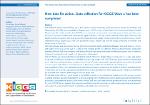New data for action. Data collection for KiGGS Wave 2 has been completed
Mauz, Elvira
Gößwald, Antje
Kamtsiuris, Panagiotis
Hoffmann, Robert
Lange, Michael
Schenck, Ursula von
Allen, Jennifer
Butschalowsky, Hans
Frank, Laura
Hölling, Heike
Houben, Robin
Krause, Laura
Kuhnert, Ronny
Lange, Cornelia
Müters, Stephan
Neuhauser, Hannelore
Poethko-Müller, Christina
Richter, Almut
Rosario, Angelika Schaffrath
Schaarschmidt, Jörg
Schlack, Robert
Schlaud, Martin
Schmich, Patrick
Ziese, Thomas
Kurth, Bärbel-Maria
The fieldwork of the second follow-up to the German Health Interview and Examination Survey for Children and Adolescents (KiGGS) was completed in August 2017. KiGGS is part of the Robert Koch Institute’s Federal Health Monitoring. The study consists of the KiGGS cross-sectional component (a nationally representative, periodic crosssectional survey of children and adolescents aged between 0 and 17) and the KiGGS cohort (the follow-up into adulthood of participants who took part in the KiGGS baseline study). KiGGS collects data on health status, healthrelated behaviour, psychosocial risk and protective factors, health care and the living conditions of children and adolescents in Germany. The first interview and examination survey (the KiGGS baseline study; undertaken between 2003 and 2006; n=17,641; age range: 0-17) was carried out in a total of 167 sample points in Germany. Physical examinations, laboratory analyses of blood and urine samples and various physical tests were conducted with the participants and, in addition, all parents and participants aged 11 or above were interviewed. The first follow-up was conducted via telephone-based interviews (KiGGS Wave 1 2009-2012; n=11,992; age range: 6-24) and an additional sample was included (n=4,455; age range: 0-6). KiGGS Wave 2 (2014-2017) was conducted as an interview and examination survey and consisted of a new, nationwide, representative cross-sectional sample of 0- to 17-year-old children and adolescents in Germany, and the second KiGGS cohort follow-up. The completion of the cross-sectional component of KiGGS Wave 2 means that the health of children and adolescents in Germany can now be assessed using representative data gained from three study waves. Trends can therefore be analysed over a period stretching to over ten years now. As the data collected from participants of the KiGGS cohort can be individually linked across the various surveys, in-depth analyses can be conducted for a period ranging from childhood to young adulthood and developmental processes associated with physical and mental health and the associated risk and protective factors can be explored. As such, KiGGS Wave 2 expands the resources available to health reporting, as well as policy planning and research, with regard to assessing the health of children and adolescents in Germany.

